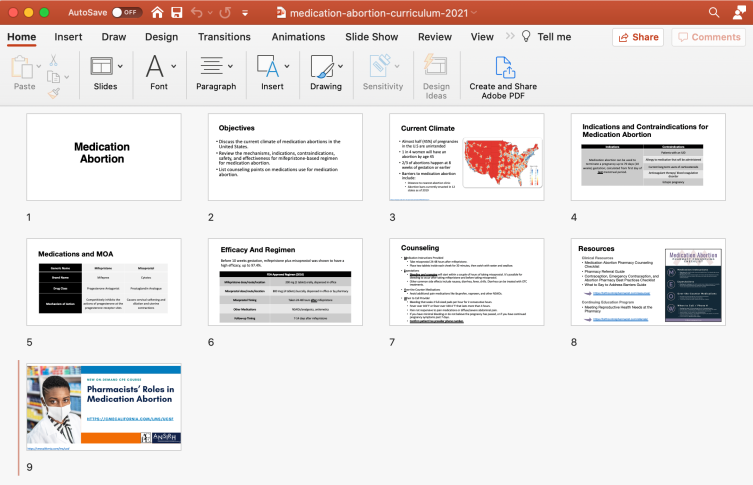The topics of reproductive health and particularly abortion remains stigmatized in today’s society despite 1 in 4 women having an abortion in their lifetime. Pharmacy school curriculums across the nation reflect this predicament, since abortion is omitted in the standard curriculum of many, if not all, pharmacy schools. Which brings up a question of how knowledgeable are student pharmacists, future medication specialists, with this subject?
Medication Abortion Curriculum was developed by the expert pharmacy educators at Birth Control Pharmacist in an attempt to better familiarize pharmacy students with the topic of medication abortion. This open access curriculum is a PowerPoint deck that is intended to be added or incorporated within a standard, larger lecture such as contraception. The slides provide the basics on medication abortion and prepare pharmacy students to dispense medications and counsel patients appropriately.
Medication abortion with a regimen of mifepristone and misoprostol has been shown to be safe and effective for decades, and is becoming increasingly utilized and acceptable to women across the world.1 Despite the growing use of these medications to induce termination of early pregnancy, the U.S. pharmacist involvement in abortion care is currently limited due to FDA imposed restrictions on how mifepristone can be distributed and dispensed.2 However, in some countries both medications are allowed to be dispensed by pharmacies rather than being limited to clinics and doctor’s offices, improving accessibility for people in need.3,4 Current research has shown great benefits of expanding the types of clinicians providing services, which may eventually lead to FDA lifting unnecessary restrictions to increase access to medication abortion through pharmacies.5
Diversification of skills and areas of expertise is necessary for any future pharmacists who want to stay relevant in tomorrow’s healthcare. Pharmacists need to be prepared to dispense and counsel on misoprostol now and may be able to offer additional patient-centered care in the future. For these reasons, pharmacists should be capable of providing patients with sufficient information, education, and safe and convenient care.
If you’re a pharmacy educator or a student who wants to advocate for medication abortion to be included in your school’s curriculum, check out the slide deck on the Resources page under Pharmacist Education and Training.

References
- Beaman J, Prifti C, Schwarz EB, et al. Medication to Manage Abortion and Miscarriage. J Gen Intern Med. 2020;35(8):2398-2405. doi:10.1007/s11606-020-05836-9.
- Raifman S, Orlando M, Rafie S, et al. Medication abortion: Potential for improved patient access through pharmacies. J Am Pharm Assoc (2003). 2018;58(4):377-381.doi:10.1016/j.japh.2018.04.011.
- Tamang A, Puri M, Masud S, et al. Medical abortion can be provided safely and effectively
by pharmacy workers trained within a harm reduction framework: Nepal. Contraception. 2018;97(2):137-143. doi:10.1016/j.contraception.2017.09.004. - Rogers C, Sapkota S, Paudel R, et al. Medical abortion in Nepal: a qualitative study on women’s experiences at safe abortion services and pharmacies. Reprod Health. 2019;16(1):105. doi:10.1186/s12978-019-0755-0.
- Weaver G, Schiavon R, Collado ME, et al. Misoprostol knowledge and distribution in Mexico City after the change in abortion law: a survey of pharmacy staff. BMJ Sex Reprod Health. 2019;46(1):46-50. doi:10.1136/bmjsrh-2019-200394.
About the Author
Eugenia A. Haire, PharmD Candidate is a pharmacy student in the Class of 2021 at the Shenandoah University Bernard J. Dunn School of Pharmacy. Eugenia completed an elective APPE rotation with Birth Control Pharmacist.
